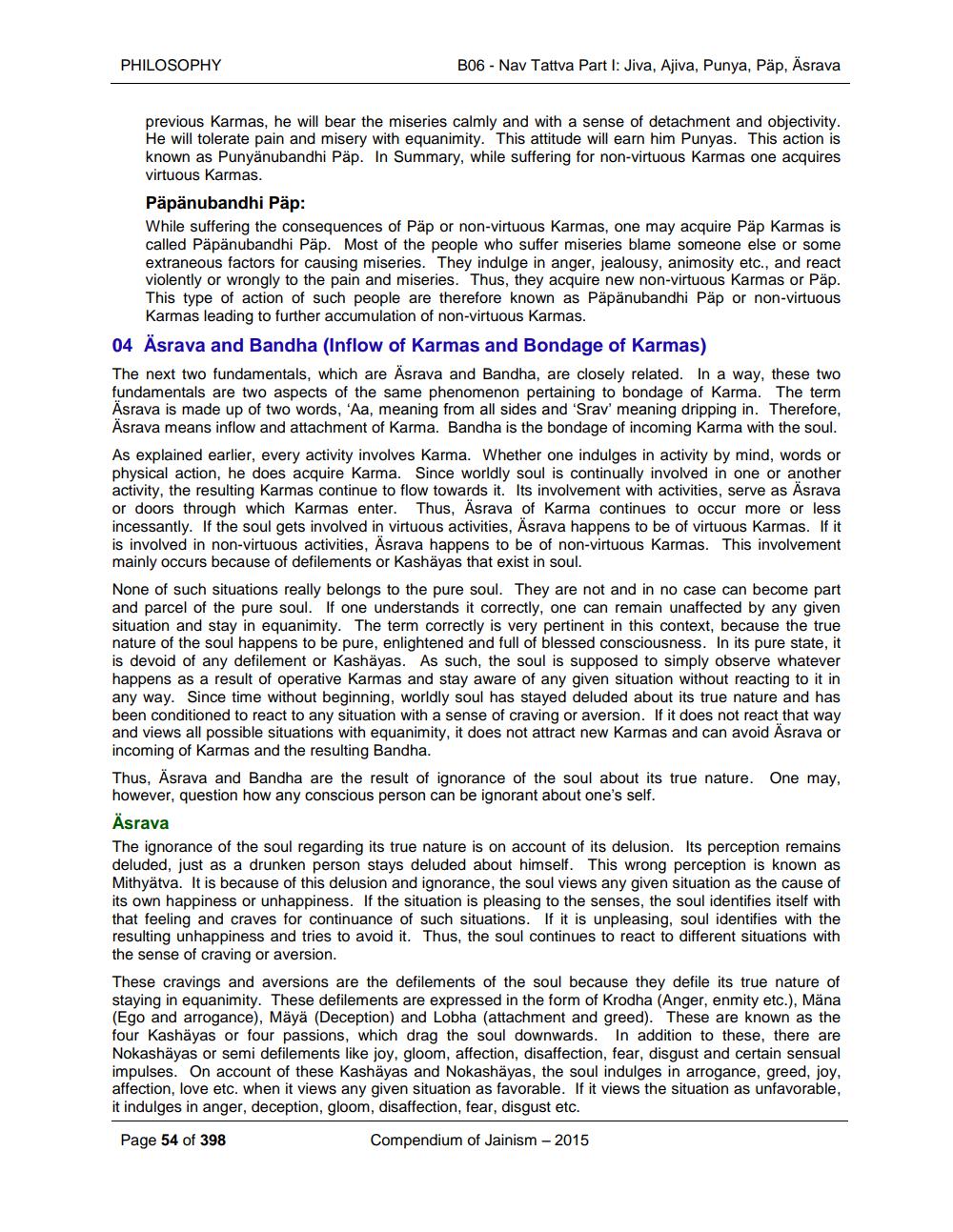________________
PHILOSOPHY
B06 - Nav Tattva Part I: Jiva, Ajiva, Punya, Päp, Äsrava
previous Karmas, he will bear the miseries calmly and with a sense of detachment and objectivity. He will tolerate pain and misery with equanimity. This attitude will earn him Punyas. This action is known as Punyänubandhi Päp. In Summary, while suffering for non-virtuous Karmas one acquires virtuous Karmas. Päpänubandhi Päp: While suffering the consequences of Päp or non-virtuous Karmas, one may acquire Päp Karmas is called Päpänubandhi Päp. Most of the people who suffer miseries blame someone else or some extraneous factors for causing miseries. They indulge in anger, jealousy, animosity etc., and react violently or wrongly to the pain and miseries. Thus, they acquire new non-virtuous Karmas or Päp. This type of action of such people are therefore known as Päpänubandhi Päp or non-virtuous
Karmas leading to further accumulation of non-virtuous Karmas. 04 Asrava and Bandha (Inflow of Karmas and Bondage of Karmas) The next two fundamentals, which are Äsrava and Bandha, are closely related. In a way, these two fundamentals are two aspects of the same phenomenon pertaining to bondage of Karma. The term Asrava is made up of two words, 'Aa, meaning from all sides and 'Sray' meaning dripping in. Therefore, Asrava means inflow and attachment of Karma. Bandha is the bondage of incoming Karma with the soul. As explained earlier, every activity involves Karma. Whether one indulges in activity by mind, words or physical action, he does acquire Karma. Since worldly soul is continually involved in one or another activity, the resulting Karmas continue to flow towards it. Its involvement with activities, serve as Asrava or doors through which Karmas enter. Thus, Asrava of Karma continues to occur more or less incessantly. If the soul gets involved in virtuous activities, Asrava happens to be of virtuous Karmas. If it is involved in non-virtuous activities, Asrava happens to be of non-virtuous Karmas. This involvement mainly occurs because of defilements or Kashäyas that exist in soul. None of such situations really belongs to the pure soul. They are not and in no case can become part and parcel of the pure soul. If one understands it correctly, one can remain unaffected by any given situation and stay in equanimity. The term correctly is very pertinent in this context, because the true nature of the soul happens to be pure, enlightened and full of blessed consciousness. In its pure state, it is devoid of any defilement or Kashäyas. As such, the soul is supposed to simply observe whatever happens as a result of operative Karmas and stay aware of any given situation without reacting to it in any way. Since time without beginning, worldly soul has stayed deluded about its true nature and has been conditioned to react to any situation with a sense of craving or aversion. If it does not react that way and views all possible situations with equanimity, it does not attract new Karmas and can avoid Asrava or incoming of Karmas and the resulting Bandha. Thus, Äsrava and Bandha are the result of ignorance of the soul about its true nature. One may, however, question how any conscious person can be ignorant about one's self. Äsrava The ignorance of the soul regarding its true nature is on account of its delusion. Its perception remains deluded, just as a drunken person stays deluded about himself. This wrong perception is known as Mithyätva. It is because of this delusion and ignorance, the soul views any given situation as the cause of its own happiness or unhappiness. If the situation is pleasing to the senses, the soul identifies itself with that feeling and craves for continuance of such situations. If it is unpleasing, soul identifies with the resulting unhappiness and tries to avoid it. Thus, the soul continues to react to different situations with the sense of craving or aversion.
These cravings and aversions are the defilements of the soul because they defile its true nature of staying in equanimity. These defilements are expressed in the form of Krodha (Anger, enmity etc.), Mäna (Ego and arrogance), Mäyä (Deception) and Lobha (attachment and greed). These are known as the four Kashäyas or four passions, which drag the soul downwards. In addition to these, there are Nokashäyas or semi defilements like joy, gloom, affection, disaffection, fear, disgust and certain sensual impulses. On account of these Kashayas and Nokashayas, the soul indulges in arrogance, greed, joy, affection, love etc. when it views any given situation as favorable. If it views the situation as unfavorable, it indulges in anger, deception, gloom, disaffection, fear, disgust etc.
Page 54 of 398
Compendium of Jainism - 2015




